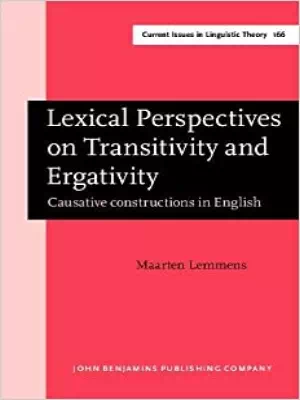Lexical Perspectives on Transitivity and Ergativity: Causative constructions in English PDF

Fusing insights from cognitive grammar, systemic-functional grammar and Government & Binding, the present work elaborates and refines Davidse’s view that the English grammar of lexical causatives is governed by the transitive and ergative paradigms, two distinct models of causation (Davidse 1991, 1992). However, on the basis of extensive synchronic and diachronic data on verbs of killing (e.g. kill, execute, choke or drown), it is shown that ‘transitivity’ and ‘ergativity’ are not absolute but prototypical characteristics of verbs which may be overruled by the semantics of the construal in which they occur. The variable transitive or ergative character of the verbs reveals the complex interaction between the semantics of the construction and that of the verb. The diachronic analyses further illustrate how in the course of time verbs may change their paradigmatic properties, either temporarily (e.g. the ergativization of strangle, throttle and smother) or permanently (e.g. the ‘causativization’ of starve or the partial transitivization of abort). The analyses show that these changes are semantically well-motivated and further illustrate the cognitive reality of the two causative models. The work explores the experiential basis of the prototypical paradigmatic behaviour of verbs (e.g. the ergative predilection of the SUFFOCATE verbs). In addition, it attempts to shed more light on the semantics and restrictions of certain constructions, such as the medio-passive, the derivation of adjectives in –able, or the derivation of agentive nominals in –er.
Format:PDF
Size: 14 MB
Pages:281
Series:Current Issues in Linguistic Theory 166
Date:1998
DOWNLOAD
Lexical Perspectives on Transitivity and Ergativity: Causative constructions in English PDF
Please register to view the hidden Download Links
Please register to view the hidden Download Links
Please register to view the hidden Download Links
Please register to view the hidden Download Links